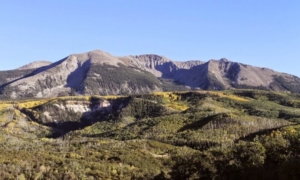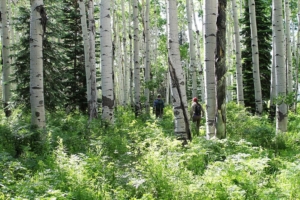Written by Audrey Wheeler
A year ago, we reported on the West Elk Coal Mine, a highly contested mine in Colorado’s Gunnison National Forest. At that time, we and many other Coloradans were concerned about Arch Coal’s proposal to expand its coal mine, which would destroy 1,720 acres of forest.
Now, those concerns have become reality. Just two weeks ago, the Trump administration’s Forest Service announced that it is forging ahead with a plan to allow the company to expand the mine. If approved, this decision will cause irreparable harm on the national forest in more ways than one.
To take a step back, the West Elk coal mine is located in western Colorado, north of Black Canyon of the Gunnison National Park. It’s an extremely controversial mine for a variety of reasons, including its location inside a roadless area of a national forest, its exemption from a new moratorium on coal leasing, and the fact that it is owned by formerly bankrupt company Arch Coal. But perhaps the most disturbing issue is the air pollution that it already causes, which would increase if the mine expands.

Mount Gunnison towering over the Sunset Roadless Area. The aspen forests on the right would be damaged by the mine expansion. Photo by Ted Zukoski of Earthjustice.
The West Elk mine has already been the single largest source of methane pollution in Colorado, spewing 58,000 tons of methane into the air every year. Methane — an immensely potent greenhouse gas — has more than 80 times the heat-trapping power of carbon dioxide, and is a major contributor to climate pollution.
Although Colorado has some of the strongest rules in the nation for methane pollution from oil and gas activity, as the Colorado Independent reports, “Unlike methane from oil and gas drilling, coal mine methane remains unregulated at both state and federal levels.” The proposed expansion to the coal mine could mean emitting enough methane to negate half of the emissions prevented by Colorado’s methane rules for oil and gas.
Plus, under Arch Coal’s plan, more than six miles of forest will be bulldozed for roads and up to 48 drilling pads will be built in the Sunset Roadless Area, which connects to the West Elk Wilderness. The area is a rolling landscape of aspen and spruce-fir forests that provide habitat for native black bear, elk, lynx, and cutthroat trout.
The actions by the Trump administration to move forward with this mine expansion are even more disturbing because of how they deal with the impacts of government projects on climate change. Previously, government environmental reviews like this had to take into account the impact of the project on climate change. Now, the Forest Service claims that calculating climate impacts is not an “appropriate tool at the project level” and is “no longer representative of governmental policy.” This comes out of a Trump executive order that disbanded the agency working group associated with it.

Hikers in the Sunset Roadless area near the West Elk mine. Photo by Ted Zukoski of Earthjustice.
The Forest Service wants to give Arch Coal access to more than 17 million tons of coal — but at what cost? The West Elk Mine already has over a decade of coal in reserve, and this decision not only ignores the economic realities that face the coal industry, but it generates even more greenhouse gas emissions, further exacerbating climate change. Coal has been central to the local economy in this area for generation, but this coal mine expansion is a bad idea for the forest and for our climate.
The negative consequences of expanding the West Elk Coal Mine and the damage it would cause to our national forest are obvious. The U.S. Forest Service is asking the public to weigh in on this problematic West Elk Coal Mine expansion. Take action today to send a message to the administration that we value our public lands too much to watch them be destroyed. Follow this link to sign a petition to the Forest Service.
This one decision could destroy aspen groves, displace native wildlife, and vent methane pollution into our air. It’s a sign of what to expect under the Trump administration in terms of our public lands — and it’s up to us to stop it.
Cover image: The West Elk Mine. Image from WildEarth Guardians flickr.



